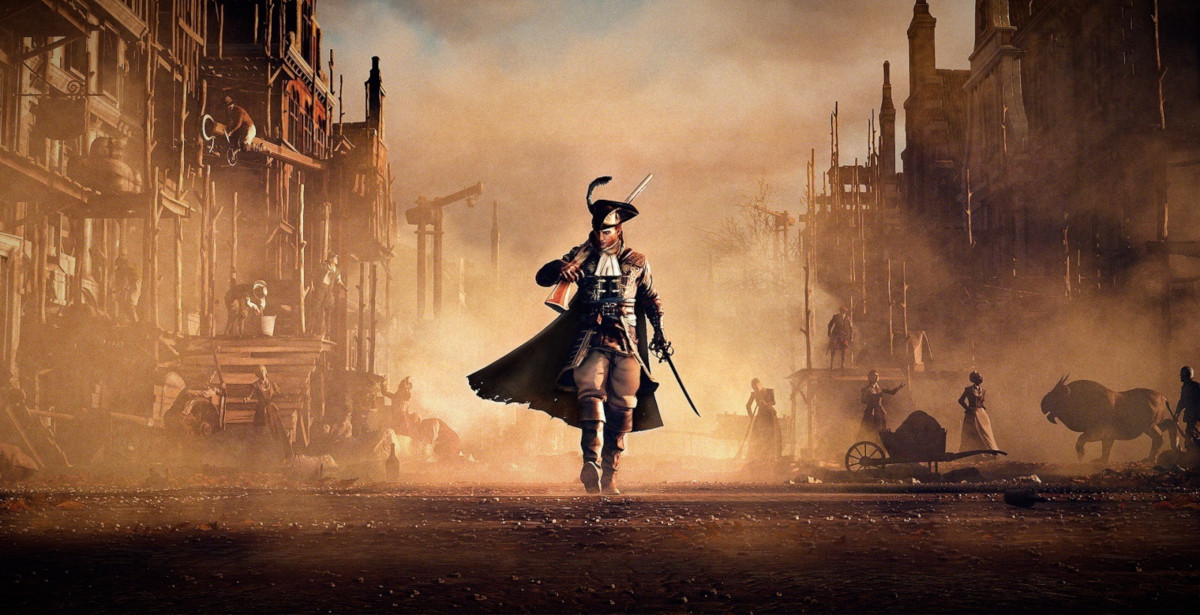narrative frustrations, various, Part 1: Greedfall
Wednesday, 12 February 2020 03:20 pmDoing the belated year in review reminded me of the two videogames I had been expecting rather excitedly and eventually played in 2019, both of which turned out to be disappointing in various ways. And as this got ranty, I think this may be several posts.
Greedfall was in many ways beautiful to play: an extremely well-produced fantasy RPG with Bioware-style party and romance options, minimal glitches or bugs, an aesthetic that's beyond amazing, setting and worldbuilding which are detailed and mostly original, excellent voice acting, and all-around absorbing gameplay. It's set in a sort of fantasy 17th century, which allows amazing things with costume and hats and muskets and tall ships and cities and what have you. You get to wear a cloak. Do you know how frustrating it is that the majority of fantasy RPGs don't have a cloak option? Cowards. Just because they're fiddly to programme. Greedfall manages to largely avoid the wooden plank cloak effect and unfortunate weapons clipping glitches, it can be done.

And you play a diplomat figure representing one of three developed nations in what is effectively the colonisation of a highly magical and extremely beautiful island filled with relatively technologically unadvanced native peoples and the most incredible, twisted, magical, guardian creatures.

And as you explore, and meet people, and are betrayed by your fellow colonial "allies", and encounter the creatures and peoples native to the island, it becomes more and more obvious that you are a coloniser, and your nation's leaders and policy-setters don't give a fuck about the fate of the native people and creatures, and more and more often the options you have boil down to killing them horribly and looting their corpses. You can't roleplay not wanting to be a coloniser. However hard you try to save and protect and co-operate, you keep running into encounters where all you can do is destroy, and the things you are destroying are amazing and beautiful and don't deserve to be destroyed in the name of "progress" or "profit".
And if you're me, you stop playing before you finish the game, because even if they allow some kind of last-minute reversal and boot you all the hell off the island, no possible narrative payoff could possibly make up for the bitter taste of all this inescapable colonial complicity. Of which I have quite enough, thank you very much, in my daily South African life. I don't play videogames because I want to have my nose rubbed in my lack of political agency. For fuck's sake.
Ultimately, I'd love to believe that this was a deliberate ideological choice on the part of the designers: that they are inviting you to replicate 17th-century colonialism in order to make you feel its evils and your complicity with them. But I can't, because the textual evidence of the gameplay and the worldbuilding simply don't support it. This is a game about cool visuals and nifty alt-17th-century gear, it's not a sophisticated critique. Which is an enormous pity, because its potential is vast.
Greedfall was in many ways beautiful to play: an extremely well-produced fantasy RPG with Bioware-style party and romance options, minimal glitches or bugs, an aesthetic that's beyond amazing, setting and worldbuilding which are detailed and mostly original, excellent voice acting, and all-around absorbing gameplay. It's set in a sort of fantasy 17th century, which allows amazing things with costume and hats and muskets and tall ships and cities and what have you. You get to wear a cloak. Do you know how frustrating it is that the majority of fantasy RPGs don't have a cloak option? Cowards. Just because they're fiddly to programme. Greedfall manages to largely avoid the wooden plank cloak effect and unfortunate weapons clipping glitches, it can be done.

And you play a diplomat figure representing one of three developed nations in what is effectively the colonisation of a highly magical and extremely beautiful island filled with relatively technologically unadvanced native peoples and the most incredible, twisted, magical, guardian creatures.

And as you explore, and meet people, and are betrayed by your fellow colonial "allies", and encounter the creatures and peoples native to the island, it becomes more and more obvious that you are a coloniser, and your nation's leaders and policy-setters don't give a fuck about the fate of the native people and creatures, and more and more often the options you have boil down to killing them horribly and looting their corpses. You can't roleplay not wanting to be a coloniser. However hard you try to save and protect and co-operate, you keep running into encounters where all you can do is destroy, and the things you are destroying are amazing and beautiful and don't deserve to be destroyed in the name of "progress" or "profit".
And if you're me, you stop playing before you finish the game, because even if they allow some kind of last-minute reversal and boot you all the hell off the island, no possible narrative payoff could possibly make up for the bitter taste of all this inescapable colonial complicity. Of which I have quite enough, thank you very much, in my daily South African life. I don't play videogames because I want to have my nose rubbed in my lack of political agency. For fuck's sake.
Ultimately, I'd love to believe that this was a deliberate ideological choice on the part of the designers: that they are inviting you to replicate 17th-century colonialism in order to make you feel its evils and your complicity with them. But I can't, because the textual evidence of the gameplay and the worldbuilding simply don't support it. This is a game about cool visuals and nifty alt-17th-century gear, it's not a sophisticated critique. Which is an enormous pity, because its potential is vast.